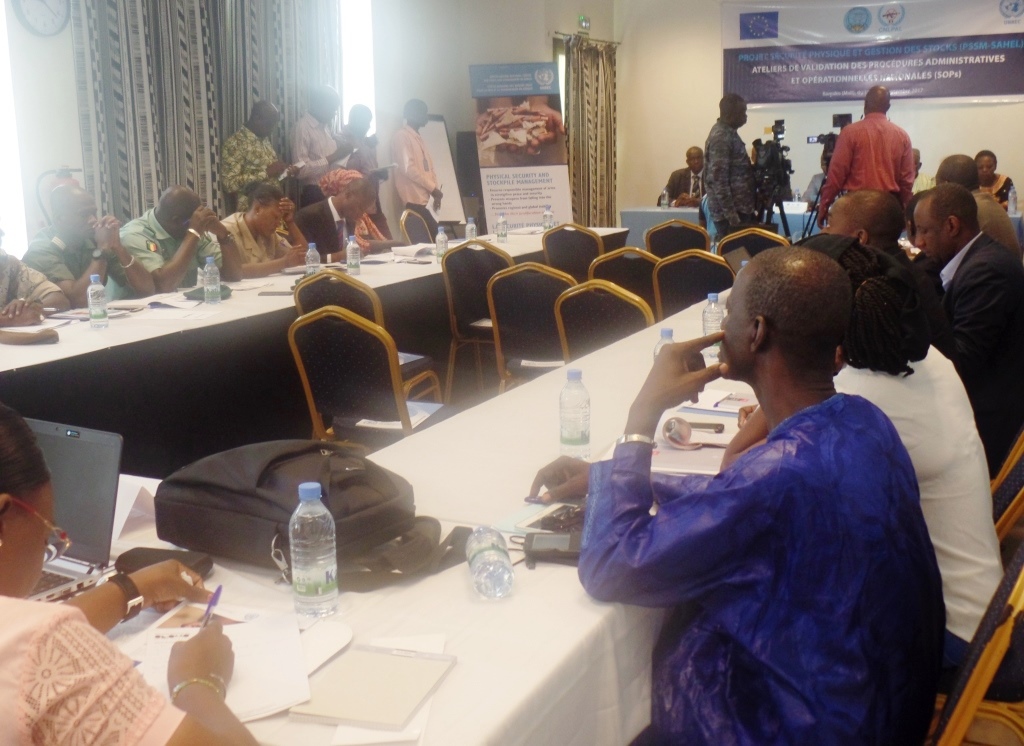 In a landmark development, senior political decision-makers and technical directors of the government of Mali have given their mark of approval to the PSSM Standard Operating Procedures (SOPs) developed by United Nations Regional Center for Peace and Disarmament in Africa (UNREC) within the framework of the UNREC-led Physical Security and Stockpile Management –PSSM Sahel project. This important development was arrived at after intense consultations between Malian authorities and UNREC in September 2017 during which UNREC, in collaboration with the Malian National Commission for the Fight against the Proliferation of Small Arms and Light Weapons organized two back to back workshops in Bamako.
In a landmark development, senior political decision-makers and technical directors of the government of Mali have given their mark of approval to the PSSM Standard Operating Procedures (SOPs) developed by United Nations Regional Center for Peace and Disarmament in Africa (UNREC) within the framework of the UNREC-led Physical Security and Stockpile Management –PSSM Sahel project. This important development was arrived at after intense consultations between Malian authorities and UNREC in September 2017 during which UNREC, in collaboration with the Malian National Commission for the Fight against the Proliferation of Small Arms and Light Weapons organized two back to back workshops in Bamako.
These workshops brought together over 40 political decision makers and national experts to comprehensively review the PSSM SOPs developed by UNREC based on the latest cutting-edge knowledge and technology, notably the International Small Arms Control Standards (ISACS) and the International Ammunitions Technical Guidelines (IATGs). These SOPs have also been designed to conform to the Economic Community of West African States (ECOWAS’s) Small Arms protocol, which Mali has already ratified.
For Mali, which is facing an unprecedented security crisis, the control of small arms and light weapons (SALW) is a high priority for the country’s security agencies. The fallout from the Libyan crisis and the rise in extremism in the Sahel region have led to a high level of proliferation of illicit SALW in the region and is fuelling the activities of armed rebel groups, terrorists and organized criminal networks engaged in weapons, drugs and human trafficking activities. The combination of these factors and the negative impact on national security and the socio-economic development aspirations of the country have made the need to better secure and manage state stockpiles even more pressing. In this regard, the support provided by UNREC in developing and proposing the PSSM SOPs could not have been timelier.
During the four days of the workshops, security experts from the government of Mali and UNREC, comprehensively reviewed and discussed the details of the SOPs, in the process providing pertinent amendments, modifications and additions, in congruence with both the current and projected future needs of PSSM and SALW control in Mali.
A bonus gain of these highly participative events was the opportunity not only to convene the various SALW actors in the same venue and provide a forum to share perspectives and ideas, but also very importantly the opportunity to raise awareness and sensitize participants from the various sectors on PSSM and SALW issues. For instance, in the words of the Vice President of the National Assembly’s Security and Defense Committee “…the committee is now much better informed on the links between its work and PSSM and will definitely take this into account in its oversight and legislative work at the National Assembly”. Likewise, the ministries of justice an environment also expressed their satisfaction at being recognized and included as stakeholders in the SALW control sector.
Accordingly, in what can only be described as a major milestone in the collaboration between the government of Mali and UNREC on PSSM and SALW control, the amended and adapted SOPs document validated at the end of these workshops incorporated inputs from all relevant state sectors concerned with security and SALW control and management. As such, it enjoys a high level of ownership by the Malian counterparts and it is expected that under the able leadership of the National SALW Commission, the document will be fast tracked for adoption as the official national PSSM SOPs reference standard. It is noteworthy that this major development comes in the wake of yet another highly successful engagement in August 2016, during which UNREC supported Malian authorities in finalizing the draft proposed national firearms law. In the same spirit, UNREC will continue to remain at hand to provide as much support as will be needed by the Malian authorities in ensuring effective PSSM and SALW control throughout the country and the region.
 |
 |
 Who we are
Who we are  What we do
What we do  Overview
Overview  Specific Projects
Specific Projects  Calendar of Events
Calendar of Events  Useful Links
Useful Links  Resolutions/SG Reports
Resolutions/SG Reports  Newsletter/UNREC Focus
Newsletter/UNREC Focus  Contact Us
Contact Us  Join Us
Join Us  Employment
Employment  Rosters of Experts
Rosters of Experts  Internships
Internships 